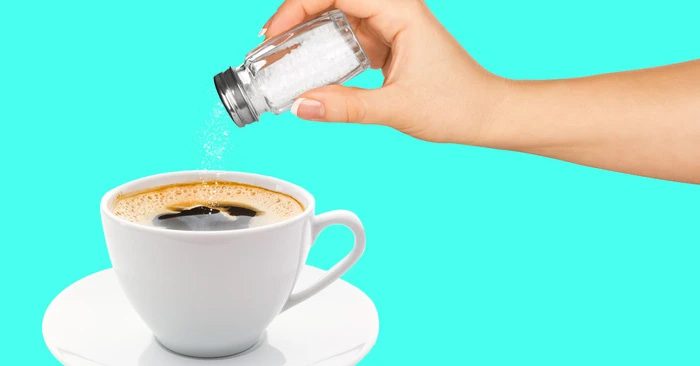Salted coffee is not a new drink, but it has recently become a trend loved by many young people. It features a mix of flavors, including a hint of saltiness, a creamy sweetness, and the bitterness of coffee.
Health Benefits of Salted Coffee
However, many opinions suggest that drinking coffee with salt may negatively affect health due to the salt content in this beverage. So, what is the truth behind this information? Is this drink truly beneficial or harmful to health?

Does the salt content in salted coffee affect health? (Image: Internet).
1. Is salted coffee good for health?
In fact, adding salt to coffee can offer several benefits. A study published in the Journal of Food Science in 2010 examined the effects of adding salt to coffee on sensory properties such as taste, aroma, and palatability. The study found that adding salt helps reduce bitterness and acidity while enhancing sweetness and smoothness.
Importantly, the amount of salt typically added to coffee is very small and unlikely to cause negative health effects. Moreover, consuming salted coffee in moderation can provide various health benefits, such as:
1.1. Helps prevent dehydration
As is known, coffee is a beverage that can lead to dehydration because the caffeine in coffee increases blood flow to the kidneys and prompts this organ to excrete more water, resulting in increased urination.
However, when salt is added to coffee, it can help retain water better, balance fluid levels in the body, and prevent dehydration. This does not mean you should skip drinking water or other fluids; you should still aim for about 2 liters of water per day, depending on individual health conditions.

Adding salt to coffee helps retain water better and balance fluids in the body. (Image: Internet).
1.2. Reduces acidity, beneficial for digestion
Salt can promote the production of digestive juices, thereby aiding the digestion of food. Coffee may be easier to digest with added salt, as it can assist in breaking down coffee more effectively in the body.
Additionally, coffee is known to be acidic, which can cause indigestion, acid reflux, heartburn, and other digestive issues. By adding salt to coffee, you can help neutralize acidity and reduce the side effects of coffee on the digestive system. This may help lessen the likelihood of acid reflux, heartburn, and bloating…
Furthermore, salt reduces the acidity of coffee, which can also help prevent enamel erosion caused by acid exposure.
1.3. Increases alertness
Typically, caffeine—a natural energy booster in coffee—can help keep you alert and focused for extended periods. However, salt can enhance the level of caffeine absorption in your body when added to coffee. As a result, you will benefit from the effects of caffeine more quickly and effectively.

Adding salt can improve caffeine absorption in your body, helping you feel more alert quickly. (Image: Internet).
1.4. Provides nutritional value
Salt contains essential minerals that are beneficial to our health beyond being a seasoning. In fact, by adding salt to coffee, you are increasing your intake of beneficial minerals like potassium, sodium, and chloride. These minerals are vital for normal fluid balance, nerve function, and muscle function in the body.
1.5. Lowers blood pressure
According to a study, adding salt to coffee can actually help lower blood pressure. The body produces more nitric oxide when salt is present, which helps relax blood vessels and improve blood flow. Lowering blood pressure can reduce the risk of heart disease and other cardiovascular issues.
However, you may wonder, as experts recommend that individuals with high blood pressure should limit their salt intake. This is indeed true, but it does not mean you have to eliminate salt from your diet entirely. For those with high blood pressure or cardiovascular issues, the recommended sodium intake is about 1.5g per day.
While salted coffee offers many health benefits, it is crucial to be mindful of your salt consumption. The recommended daily sodium intake for adults is 2,300 milligrams, equivalent to about one teaspoon of salt.
2. Can salted coffee affect health if consumed excessively?
While it may not severely impact health, consuming too much salted coffee can pose certain health risks, such as:
- Affecting cardiovascular health: Consuming an adequate amount of salt is good for health, but excessive salt intake can lead to conditions such as high blood pressure, increasing the risk of heart disease and stroke.
- Water retention: Eating too much salt can also lead to water retention, causing swelling and bloating. This can be problematic for those with heart or kidney issues.
- Possible interactions with medications: Some medications, such as those for hypertension, may interact with salt and cause issues. If you are taking any medications, it is essential to consult your doctor before adding salt to coffee or making any other dietary changes.
If you opt for salted coffee with cream or sweetened condensed milk, frequent consumption may also expose you to risks of obesity and diabetes…

Drinking too much salted coffee may increase the risk of cardiovascular disease, diabetes, and obesity… (Image: Internet).
3. How much salt should be added to coffee?
The amount of salt you should add to coffee depends on personal preference and the type of coffee you are using. If you are using a bitter coffee, such as dark roast, a pinch of salt can balance the bitterness and enhance the flavor. If you prefer sweeter coffee, you may not need to add any salt at all.
It is important to note that too much salt can make your coffee taste excessively salty. You should start with a small amount, such as a pinch, and gradually increase it until you achieve the desired flavor, but avoid adding too much.
Overall, salted coffee is a delicious beverage that does not adversely affect health. However, if you have consumed a lot of sodium throughout the day, you should consider this drink carefully. Moderation is key to protecting your health. Specifically, you should brew coffee at home to control the appropriate amount of salt.


















































